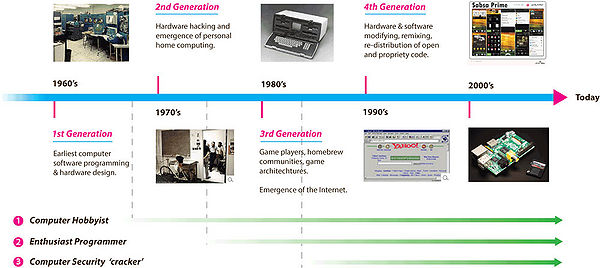Hacker Generations and Evolution
Although the extant typology of hacker activities along the illegal-to-legal dimension is useful in delineating differing types in terms of destructivity, creativity, piracy and theft, remixing of value etc., it does not take into account the evolution of different hacker types over time since their initial emergence. The typology assumes all hackers are constituent of the same generation, which is clearly not the case, given the incremental emergence of hacker generations since the 1960’s (see below).
Viewed in this way in temporal form, the Computer Security Crackers are a relatively new phenomenon; an inevitable result by those seeking to exploit and illegally profit from new emergent and openly available technologies (distributed home computing, micro-chips, networks and Internet communication technologies).
Computer Hobbyists and Enthusiast Programmers emerged long before Computer Security Crackers (despite the current focus of meaning in popular culture) and in some instances created entire industries as in the personal home computing sector.
Hackers were in fact first defined in 1984 in a book called Hackers: Heroes of the Computer Revolution, described as having evolved through several generations. An extension of this is offered below.
Contents
[hide]1st Generation Hackers (1960’s/70’s)
- Hackers involved in the earliest computer programming techniques development for technology exploration.
2nd Generation Hackers (mid 1970’s to mid 1980’s)
- Hackers in computer hardware production during the advent of Personal Computer by modifying and creating new hardware configurations (Apple, Microsoft: Jobs, Wozniak, Allen, Gates et al.).
3rd Generation Hackers (1980’s to mid 1990’s)
- Hacker-game players devoting leisure time to writing scripts and programmes for game architectures amidst the emergence of Open Source software development [Jeppessen, 2003].
4th Generation Hackers (late 1990’s to today)
- Hackers freely modifying, remixing, reconfiguring and re- distributing open and proprietary knowledge extracted from creative IP from consumer artefacts, technology, products and services facilitated by the use of information and communication technologies (ICT’s).
